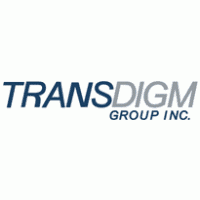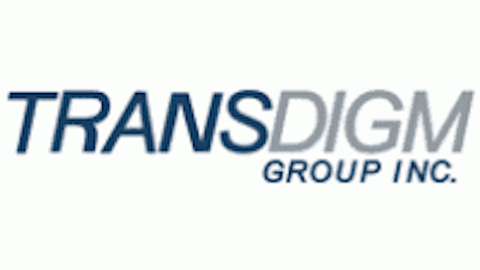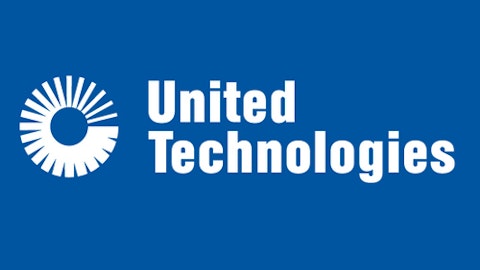Choice (or the lack thereof) matters. A company is more likely to have a sustainable competitive advantage if its customers have limited choices when it comes to purchasing similar products. TransDigm Group Incorporated (NYSE:TDG), an aerospace-parts supplier focused on small, niche parts, is the single source of supply for its customers for more than three-quarters of its products in terms of revenue. But a good company is not necessarily a good stock. Borrowing to pay dividends is something I shun, which is what it did recently. Furthermore, it is expensive, trading at a premium to its peers at 18.7 times forward P/E.
Niche products are an advantage
TransDigm Group Incorporated (NYSE:TDG)’s choice of selling niche aerospace parts puts it in a strong competitive position vis-à-vis its peers.
Firstly, one of the ways to determine if a company has a competitive advantage is to see if its customers have sufficient alternatives to the products they are buying. Some 90% and 75% of TransDigm’s revenue is generated from proprietary and single-source products, respectively. This suggests that TransDigm Group Incorporated (NYSE:TDG) has a stronger bargaining power vis-à-vis its customers.
Secondly, customers tend to be more price sensitive if the particular product makes up a big proportion of their budgets. In TransDigm’s case, its aerospace parts are a relatively small part of the total cost of a plane, suggesting that its customers are less likely to haggle over price. The numbers speak for themselves. Since its listing in 2006, TransDigm Group Incorporated (NYSE:TDG) has delivered consistent gross margins above 50% every single year.
Last but not least, have you ever wondered why sport shoes usually don’t last beyond a year? Companies which make products that last forever must win new customers all the time. On the contrary, it is much easier to convince an existing customer to replace his old or damaged products with new ones from the same vendor. TransDigm Group Incorporated (NYSE:TDG)’s aerospace parts are subject to the usual wear and tear and its customers need to go back to TransDigm for replacement parts several times in the life cycle of a plane.
Less cyclical than perceived
While most investors have the perception that all aerospace companies are cyclical in natural, this is not necessarily true. TransDigm has a significant aftermarket business that accounted for more than half and three-quarters of its fiscal 2012 revenue and EBITDA, respectively. Unlike its OEM business, which is affected by the profitability of airlines, TransDigm Group Incorporated (NYSE:TDG)’s aftermarket business is more stable, relying on the steady growth in passenger traffic and its large OEM installed base. Planes are going to have their parts replaced more frequently if they fly more.
Also, after the sales of parts on a new aircraft, TransDigm can enjoy strong recurring revenue from its aftermarket business over the next 30 years, the typical lifespan of an aircraft, according to its most recent analyst day presentation. TransDigm Group Incorporated (NYSE:TDG)’s excellent financial track record is a testimony to the “non-cyclicality” of its business. Taking into account the impact of acquisitions, it grew revenue in every single year in the past decade. It was also profitable and free cash flow positive for six consecutive years from 2007 to 2012.
Peer comparison
TransDigm’s peers include Honeywell International Inc. (NYSE:HON) and United Technologies Corporation (NYSE:UTX). TransDigm trades at a premium to its peers with a forward P/E of 18.7, compared with Honeywell and United Technologies, which are valued by the market at 14.3 and 13.6 times, respectively, forward P/E.
Typical of most free cash flow generative companies, investors are concerned about where and how Honeywell International Inc. (NYSE:HON) is deploying its cash. Honeywell currently sports a forward dividend yield of 2.1%, while share buybacks are generally opportunistic in nature. A focus on smaller bolt-on acquisitions reduces the risks of value-destroying and cash-sapping transactions.
Another concern that investors might have, is regarding the impact of budget cuts on Honeywell International Inc. (NYSE:HON)’s business. According to its most recent investor presentation, U.S. defense-related business represents less than 10% of Honeywell’s revenue and it anticipates that increased international military spending will help to partially negate the effects of any reduction in U.S. military spending.
United Technologies Corporation (NYSE:UTX) completed its acquisition of Goodrich in mid-2012 to further enhance its presence in the commercial aerospace industry. In addition to operational synergies and cost reductions, its recent wins for Embraer SA (ADR) (NYSE:ERJ)’s next generation e-jets by its units Pratt & Whitney and UTC Aerospace lend further strength to the rationale of the Goodrich acquisition.
But this acquisition comes with a price as well, with United Technologies nearly doubling its gearing from 43% to 82%. Despite this increase in leverage, United Technologies Corporation (NYSE:UTX) still sports a decent dividend yield of 2.3%. Also, according to its first quarter fiscal 2013 earnings release, it has spent $335 million on share buybacks year-to-date, on track to meet its $1 billion target.
Conclusion
Borrowing to pay dividends is essentially a transfer of wealth from debt holders to equity holders in the short term, with shareholders bearing additional financial risk subsequently. I am negative on such actions. That is exactly what TransDigm Group Incorporated (NYSE:TDG) did in the first quarter of fiscal 2013, increasing its gearing from 295% to 631% to finance a special dividend of $12.85 per share. A company with a good business may not be an equally ideal investment candidate. High leverage and a valuation premium over peers will steer me clear from this stock.
Mark Lin has no position in any stocks mentioned. The Motley Fool recommends TransDigm Group.
The article A Good Company Is Not Necessarily a Good Investment originally appeared on Fool.com.
Copyright © 1995 – 2013 The Motley Fool, LLC. All rights reserved. The Motley Fool has a disclosure policy.






